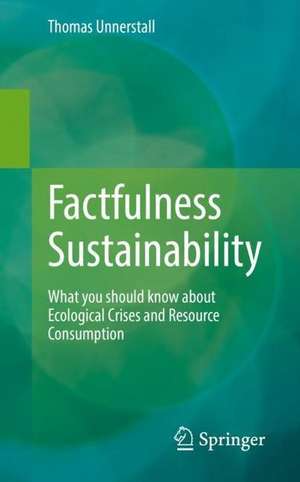Factfulness Sustainability: What you should know about Ecological Crises and Resource Consumption
Autor Thomas Unnerstallen Limba Engleză Paperback – 28 oct 2022
Who would disagree with this verdict? The evidence seems overwhelming: species extinction, rainforest deforestation, scarcity of raw materials, soil erosion, plastic waste, ecological footprint and, of course, climate change. But how reliable are these indicators? Are there perhaps also other indications, positive developments? And are all these problems of equal urgency?
This book gives you answers: well-founded, comprehensible, to the point. It proves that the reports and headlines on ecological issues in the mainstream media are often one-sided, exaggerated and thus misleading. The book does not trivialize, but it differentiates. Using the relevant international reports and databases, it presents overall contexts where otherwise usually only individual, striking figures are picked out. With over 70 graphic illustrations, the book thus paints a new picture of the state of the planet and of the effects of human economic activity and consumption. At the end is a clear list of priorities for the real sustainability challenges - for humanity as a whole, and also for the people living in the West.
Preț: 194.87 lei
Nou
Puncte Express: 292
Preț estimativ în valută:
37.29€ • 39.04$ • 30.85£
37.29€ • 39.04$ • 30.85£
Carte tipărită la comandă
Livrare economică 01-07 aprilie
Preluare comenzi: 021 569.72.76
Specificații
ISBN-13: 9783662655573
ISBN-10: 3662655578
Pagini: 244
Ilustrații: XIV, 244 p. 74 illus., 70 illus. in color.
Dimensiuni: 127 x 203 x 18 mm
Greutate: 0.35 kg
Ediția:1st ed. 2022
Editura: Springer Berlin, Heidelberg
Colecția Springer
Locul publicării:Berlin, Heidelberg, Germany
ISBN-10: 3662655578
Pagini: 244
Ilustrații: XIV, 244 p. 74 illus., 70 illus. in color.
Dimensiuni: 127 x 203 x 18 mm
Greutate: 0.35 kg
Ediția:1st ed. 2022
Editura: Springer Berlin, Heidelberg
Colecția Springer
Locul publicării:Berlin, Heidelberg, Germany
Cuprins
Introduction.- Part I - Three theses.- The most important challenge is: Switching from fossil to renewable energy sources.- "The Western way of economy and life is ecologically unsustainable" - not true.- It is worth fighting.- Part II - Basics.- World population.- Land use.- Food.- Drinking water.- Part III - Energy and raw materials.- Energy.- Raw materials.- Part IV - Ecological hotspots.- The "ecological footprint".- Biodiversity and species extinction.- Forest loss - Deforestation. Drinking water.- Part III - Energy and raw materials.- Energy.- Raw materials.- Part IV - Ecological hotspots.- The "ecological footprint".- Biodiversity and species extinction.- Forest loss - Deforestation of rainforests.- Plastic waste in the oceans.- Dead zones in the oceans - the P/N cycle.- Pollutants in the environment.- Bibliography.
Notă biografică
Dr. Thomas Unnerstall, born in 1960, studied physics, mathematics and philosophy in Germany and the USA. After receiving his doctorate in physics, he first worked for several years in the Ministry of the Environment in Baden-Württemberg and then held management positions in the energy industry for over 20 years. Today he is an international consultant and book author. His books "Faktencheck Energiewende" and "Energiewende verstehen" have also been published by Springer-Verlag.
Textul de pe ultima copertă
Humanity is overexploiting nature, we consume too much energy, too many raw materials, too much land. In short, the current economic and lifestyle patterns of mankind, especially in the West, are not sustainable.
Who would disagree with this verdict? The evidence seems overwhelming: species extinction, rainforest deforestation, scarcity of raw materials, soil erosion, plastic waste, ecological footprint and, of course, climate change. But - how reliable are these indicators? Are there perhaps also other indications, positive developments? And are all these problems of the same urgency?
This book gives answers: well-founded, comprehensible, to the point. It proves that the reports and headlines in the mainstream media on global ecological issues are often one-sided, exaggerated and misleading. On the basis of the relevant international reports and databases, the book gives the full picture where usually only individual, striking figures are presented.
Over 70graphic illustrations, concise summaries at the end of most chapters – an easy read!
The author
Dr. Thomas Unnerstall is an international consultant and book author. After completing his doctorate in physics, he first worked in the Ministry of the Environment in Baden-Württemberg and then held top management positions in the energy industry for over 20 years.
This translation of the German edition was done with the help of artificial intelligence (machine translation by the service DeepL.com). A subsequent human revision was done primarily in terms of content.
Who would disagree with this verdict? The evidence seems overwhelming: species extinction, rainforest deforestation, scarcity of raw materials, soil erosion, plastic waste, ecological footprint and, of course, climate change. But - how reliable are these indicators? Are there perhaps also other indications, positive developments? And are all these problems of the same urgency?
This book gives answers: well-founded, comprehensible, to the point. It proves that the reports and headlines in the mainstream media on global ecological issues are often one-sided, exaggerated and misleading. On the basis of the relevant international reports and databases, the book gives the full picture where usually only individual, striking figures are presented.
Over 70graphic illustrations, concise summaries at the end of most chapters – an easy read!
The author
Dr. Thomas Unnerstall is an international consultant and book author. After completing his doctorate in physics, he first worked in the Ministry of the Environment in Baden-Württemberg and then held top management positions in the energy industry for over 20 years.
This translation of the German edition was done with the help of artificial intelligence (machine translation by the service DeepL.com). A subsequent human revision was done primarily in terms of content.
Caracteristici
Provides a sound and comprehensible assessment of the major ecological crises Sets out clear priorities for our future action Reassesses the facts on the issue of sustainability
